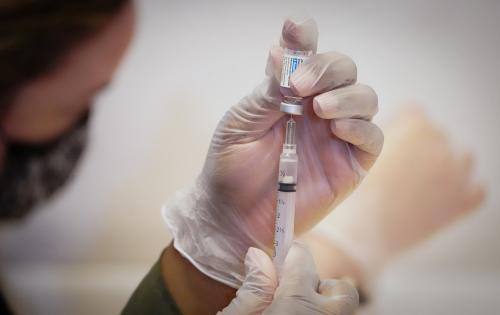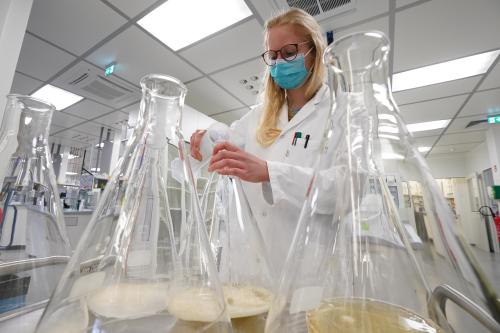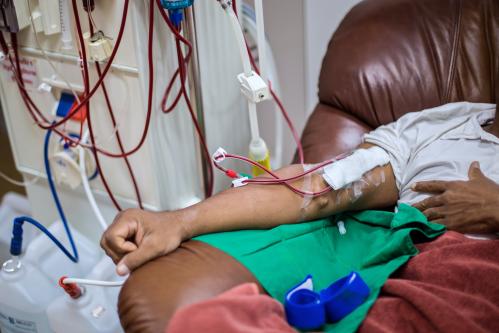Just a few months ago, we almost sang a song of triumph in the fight against the pandemic. The infection numbers drastically decreased in countries with high vaccination rates. The Tokyo Olympic Games ended without a big outbreak. Many sports leagues resumed their activities, like Major League Baseball and the English Premier League. We dreamed of a world that was back to normal.
And then the COVID-19 delta variant emerged and changed everything. Although there is still some debate around booster shots, distributing a booster shot and tackling vaccine hesitancy seem to be needed to end the pandemic. A recent Israeli study shows that the booster shot is 86 percent effective in preventing infection among the older population. The U.S. Centers for Disease Control and Prevention has also reported that while vaccines show declining effectiveness against infection in general, they still show strong protection against hospitalization despite the variant. Once the model for defeating COVID-19, Israel is now facing a new stage of the pandemic—the infection count hit 8,000 as of August 17 (a month prior there were only 27 new cases) due to the delta variant. The booster shot of the COVID-19 vaccine is more necessary than ever. The problem is encouraging people to get it.
In March and August 2021, the Social Policy Institute (SPI) at Washington University in St. Louis and the Interdisciplinary Center (IDC) in Herzliya launched two nationally representative surveys to understand vaccination trends in Israel. The second survey asked respondents’ intention to get a third booster shot if available. Through the survey we found:
- Demographic and socioeconomic characteristics were significant predictors of vaccination behaviors of Israelis in March 2021, but less so in August 2021.
- Throughout the pandemic, confidence in COVID-19 vaccines is a major factor in vaccine hesitancy.
Findings
Who are the unvaccinated Israelis?
To understand those who are vaccine hesitant, we investigated the demographic and socioeconomic correlates to vaccination in Israel. In March 2021, 61.5 percent of 1,517 respondents answered that they had received at least one dose of a COVID-19 vaccine. Notably, vaccination rates varied by demographic and socioeconomic characteristics. The logistic regression model estimated that males (65.7%), older adults (Generation X: 71.0%; baby boomers: 83.4%), parents with one child (66.8%), those with a bachelor’s degree (67.2%), those in higher-income groups (fourth quintile: 68.7%; fifth quintile: 72.4%), and employed respondents (64.5%) were more likely to get vaccinated than the average population (p <0.05). In contrast, those in the youngest adult group (i.e., millennials and Generation Z; 47.7%), Haredi Jews (49.2%), Arab Israelis (52.4%), and those in the lowest income quintile (52.1%) were significantly less likely to be vaccinated (p <0.05). That is, receipt of a vaccination dose was a function of Israelis’ demographic and socioeconomic conditions.
In August 2021, almost 9 out of 10 survey respondents (n=895; 89.1%) received one or more doses of the vaccine. Interestingly, most of the vaccination disparities that we observed in March were no longer present. However, Haredi Jews (78.0%) and Arab Israelis (82.7%) exhibited significantly lower vaccination rates (p<0.05), yet these disparities also disappeared when we limited the sample to those who had not been infected. In other words, disproportionate COVID-19 infection rates across ethnic/religious groups substantially explain the lower vaccination rates in minority Israeli communities who think they received immunity through sickness.
Who will not get a booster shot?
To understand who is not willing to get a booster shot, we first explore Israelis’ intentions. The results are quite similar to those in March. Overall, 66.9 percent of the survey respondents answered that they would get a booster shot if it was available. Similar to the results in March, males (72.1%), older adults (83.7%), and those with a bachelor’s degree (71.2%) were more willing to get the third shot (p<0.05). In contrast, females (63.1%), young generations (60.4%), and minority groups (e.g., Arab Israelis, 58.8%) hesitated to get another vaccine (p<0.05).
Vaccine hesitancy
The World Health Organization describes three reasons (3Cs) for not getting vaccinated—convenience, complacency, and confidence. Given that COVID-19 vaccines are highly accessible in Israel (and we asked “given COVID-19 vaccines are accessible”), we assume that the latter two—i.e., complacency and confidence―are the two driving factors for the vaccine hesitancy. That is, people would not get vaccinated because they think they don’t need it (complacency) or, they are concerned with vaccines’ effectiveness and/or safety (confidence).
Results from our survey suggest that confidence was the key reason for not getting a vaccine. In March, more than half of those who did not get a vaccine (51.7%) cited concerns over the vaccines’ long-term safety. Also, more than a fourth of the unvaccinated (25.7%) believed that COVID-19 vaccines would not be effective. Surprisingly, substantial numbers of the respondents exhibited mistrust of the government (30.3%) and pharmaceutical companies (31.0%). When asked about risk, only 9.2 percent of unvaccinated respondents answered that they refused a vaccine because COVID-19 was not fatal.
When we asked the same questions five months later (August 2021), confidence was still the main reason for anti-vaccine behaviors. However, people’s concerns about the safety and effectiveness of COVID-19 vaccines shifted. On one hand, respondent’s concerns with the long-term safety of vaccines were a bit alleviated (51.7% to 45.9%). On the other hand, a higher proportion of respondents questioned the effectiveness of the vaccines (25.7% to 39.8%) even though they observed how vaccines lowered COVID-19 cases. Interestingly, while people’s mistrust of pharmaceutical companies did not change substantially (31.0% to 34.7%), their mistrust of the government was lower (30.3% to 24.5%).
How information sources translate to vaccine hesitancy
Then, what affects people’s vaccination behaviors? We asked what source of information would influence the decision to get vaccinated. Our second survey (August 2021) shows that more people were influenced by information from experts, such as health care providers (80.0%) and scientific articles (75.6%), as well as family members (76.0%). Almost half of the respondents refer to opinions and information from friends (54.1%) and acquaintances (e.g., neighbors, colleagues; 47.2%). While two-thirds of the respondents (64.9%) reported that media affects their vaccination decisions, one-third answered that social networks impacted their decisions.
The disparity between those who did and did not get a vaccine is striking. Our logistic model estimates that people’s vaccination status is significantly related to their susceptibility to particular information sources regarding vaccination. For instance, people who are influenced by family members are 2.7 times more likely to get vaccinated (p <0.01). Also, those influenced by information from the press and the mass media are 2.2 times more likely to get a vaccine (p <0.01). Strikingly, those who rely on information from social media are 35 percent less likely to get vaccinated (p <0.05).
How to encourage people to get a booster shot of the COVID-19 vaccine
Our research shows that confidence in the booster shot matters. To encourage the third shot, we need to assure people that an additional booster shot is safe and effective. Our survey also shows that message and media matter—that is, the media is a pivotal pathway to convince the public. Our findings indicate that younger generations are the most hesitant to receive booster shots and social media is correlated with increased vaccine hesitancy. In order to combat this, an effective program should target youth with social media campaigns that promote scientifically sound information. We also need to devise a plan to address the spread of false information on social and other media channels. Although we have a better understanding of the board that we are playing on, the game is not yet over and vaccines still matter.
Along with the variation in willingness to get the vaccination across population groups and age groups, our data also shows that a major part of the vaccination action is determined by people’s perceptions. The more people are afraid of being infected with COVID-19, the more likely they are to get the vaccine, and the more they are afraid of the vaccine’s side effects or feel that there is not enough transparency in this regard, the less likely they are to get the vaccine. These three perceptions together—fear of COVID-19, fear of vaccine side effects, and belief in a lack of transparency—provide an explanation for approximately 40 percent of vaccination action, compared to approximately 20 percent explained by subpopulation affiliation. This suggests that information matters and therefore governments should invest much effort in conveying precise and transparent information to the public.
Israel’s experience vaccinating its population is a relevant example for the world, as it is a leading country with respect to the share of the population that is vaccinated and it is the first to broadly offer a third booster shot. Therefore, while the above recommendations are relevant to the Israeli government for improving its vaccination effort, they may be more effective for governments in the earlier stages of vaccination for which it is worthwhile to learn from the Israeli experience. It is also worth noting that the Israeli media extensively supports vaccination, whereas in the U.S. vaccination is more controversial. The conclusions from this study demonstrate how public perceptions about the decision to vaccinate are heavily influenced and shaped by the media.
The Brookings Institution is committed to quality, independence, and impact.
We are supported by a diverse array of funders. In line with our values and policies, each Brookings publication represents the sole views of its author(s).








Commentary
The game is not yet over, and vaccines still matter: Lessons from a study on Israel’s COVID-19 vaccination
September 13, 2021